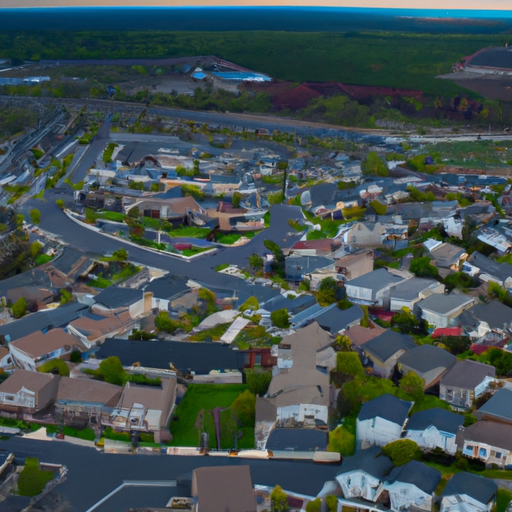Are you curious about the zoning and housing regulations in Woodbury? If so, you’ve come to the right place! In this article, we will explore everything you need to know about these regulations in a friendly and easy-to-understand manner. From what zoning laws mean for property owners to the various housing regulations in place, come along on this informative journey to gain a better understanding of how Woodbury ensures that its community remains organized and thriving. So, without further ado, let’s dive in!

Zoning Regulations
Woodbury, a vibrant city known for its picturesque neighborhoods and thriving commercial areas, has a comprehensive set of zoning regulations in place to maintain the integrity and balance of its urban landscape. These regulations provide guidelines for land use, building placement, and design aesthetics, ensuring that the city continues to grow in a sustainable and organized manner.
Overview of Zoning in Woodbury
In Woodbury, zoning serves as a tool to separate different types of land uses, such as residential, commercial, and industrial, into distinct areas or districts. Each district has its own set of regulations and restrictions to govern the types of activities and structures allowed within its boundaries. This helps to create a harmonious environment where residences are shielded from noise and pollution, while businesses can thrive in designated commercial zones.
Types of Zoning Districts
Woodbury has several zoning districts, each with its unique purpose and characteristics. The main districts include:
-
Residential Districts: These districts are primarily intended for single-family homes, providing a peaceful and family-oriented environment. They are further divided into different categories based on density and lot size, such as low-density residential, medium-density residential, and high-density residential.
-
Commercial Districts: These districts are designed to accommodate a range of commercial activities, including retail, restaurants, and offices. There are different types of commercial districts, such as neighborhood commercial, general commercial, and mixed-use commercial, each catering to different scales and types of businesses.
-
Industrial Districts: These districts are designated for manufacturing, warehousing, and other industrial activities. They are typically located away from residential areas to minimize the impact on nearby homes and provide ample space for larger industrial operations.
Zoning Classifications and Uses
Within each zoning district, specific zoning classifications and uses are defined to further specify the allowed activities and structures. For example, in residential districts, zoning classifications may include single-family residential, duplex, and townhouse, whereas commercial districts may include retail space, restaurants, and professional offices.
These classifications and uses determine the types of buildings that can be constructed, the density of development, and the overall character of the area. They are an essential component of zoning regulations, ensuring that development aligns with the intended purpose of each district.
Permitted and Prohibited Uses in Residential Zones
Residential zones in Woodbury have a set of permitted and prohibited uses to maintain the quality of life for its residents. Permitted uses typically include single-family homes, community parks, schools, and other related amenities. Prohibited uses, on the other hand, may include industrial activities, high-rise buildings, or certain commercial enterprises that are not compatible with the peaceful nature of these zones.
These regulations are in place to protect the tranquility and aesthetics of residential neighborhoods, ensuring that residents can enjoy a safe and comfortable living environment.
Commercial and Industrial Zoning Regulations
Commercial and industrial zoning regulations in Woodbury are tailored to promote economic growth while balancing the needs of the community. These regulations address various factors, including building setbacks, density, parking requirements, and access restrictions. They aim to create vibrant commercial centers that are convenient for both business owners and customers, while also preserving the character of the surrounding areas.
The regulations also take into account the potential impact on neighboring residential areas, prohibiting activities that could cause excessive noise, pollution, or traffic congestion. This ensures a harmonious coexistence between commercial and residential zones.
Zoning Variances and Special Use Permits
In certain cases, property owners or developers in Woodbury may seek relief from specific zoning regulations due to unique circumstances or proposed projects that do not strictly adhere to the existing requirements. This can be done through zoning variances or special use permits.
Zoning variances allow for deviations from certain zoning regulations, such as setback requirements or height limitations, when strict adherence would cause unnecessary hardship for the property owner. Special use permits, on the other hand, enable the approval of land uses that are not outright permitted in a particular zoning district, but may be deemed acceptable under specified conditions.
Setback and Height Requirements
Setback and height requirements play a crucial role in maintaining the visual appeal, privacy, and safety of Woodbury’s neighborhoods. Setback requirements determine the distance between buildings, property lines, and other structures, ensuring adequate space for landscaping and preventing overcrowding. Height requirements, on the other hand, limit the maximum height of buildings or structures, preventing overshadowing of neighboring properties and maintaining consistency within a district.
These requirements contribute to the overall character of each zoning district while preserving open spaces and ensuring a sense of balance within the community.
Parking and Access Requirements
Woodbury’s zoning regulations place great emphasis on parking and access to ensure convenient access to properties without causing congestion or hindering pedestrian safety. Minimum parking requirements are established based on the type of land use, such as residential, commercial, or industrial, to ensure an adequate supply of parking spaces for residents, employees, and visitors.
Additionally, access requirements such as the placement of driveways, sidewalks, and entrances are carefully planned to provide safe and efficient traffic flow while minimizing impacts on neighboring properties. These measures contribute to a well-designed cityscape that is accessible and accommodating for all.
Signage Regulations
Signage regulations play a significant role in maintaining the visual aesthetics and safety of Woodbury’s streets and neighborhoods. These regulations control the size, placement, and design of signs to ensure they are not overly intrusive or distracting.
Signs in commercial areas are regulated to prevent visual clutter and ensure businesses can effectively promote their services while maintaining the overall character of the district. Residential areas, on the other hand, have stricter limitations to preserve the peaceful and residential nature of the neighborhoods.
Zoning Compliance and Enforcement
In Woodbury, zoning compliance is crucial to maintaining the integrity of the city’s zoning regulations. Compliance ensures that properties are being used and developed in accordance with the designated zoning districts, classifications, and permitted uses.
The city is committed to enforcing zoning regulations through routine inspections and responding to complaints from residents. In cases of violations or non-compliance, appropriate actions may be taken, ranging from warnings and fines to legal action if necessary. This proactive approach to enforcement helps to ensure a harmonious and orderly community where everyone can enjoy the benefits of zoning regulations.

Housing Regulations
Woodbury’s housing regulations play a vital role in preserving the quality, safety, and diversity of its housing stock. These regulations encompass a wide range of aspects, including rental housing, single-family home requirements, multi-family housing, and more.
Rental Housing Regulations
To protect the rights and interests of tenants, Woodbury has established regulations for rental housing. These regulations cover areas such as minimum habitability standards, maintenance requirements, and tenant-landlord relationships. They aim to ensure that rental properties are safe, well-maintained, and meet appropriate health and safety standards.
Additionally, rental housing regulations address issues such as lease agreements, security deposits, and dispute resolution mechanisms to provide a fair and balanced framework for both tenants and landlords.
Single-Family Home Requirements
Woodbury’s single-family home requirements outline the standards for constructing and maintaining single-family residences. These regulations cover aspects such as minimum lot sizes, setback requirements, building heights, architectural styles, and more. They are in place to maintain the aesthetic character of residential neighborhoods while promoting high-quality construction practices.
These requirements foster a sense of pride in neighborhood appearance while ensuring that homes are built to meet the needs of modern living in a safe and functional manner.
Multi-Family Housing Regulations
Multi-family housing regulations in Woodbury address the unique considerations that come with developments such as apartments, condominiums, and townhouses. These regulations cover issues such as density, setback requirements, common areas, parking, and landscaping.
By addressing these factors, Woodbury can ensure that multi-family developments are in harmony with the surrounding neighborhood, providing a comfortable and sustainable living environment for residents.
Accessory Dwelling Units (ADUs)
Accessory Dwelling Units (ADUs), also known as mother-in-law suites or granny flats, are secondary living units located on the same property as the primary residence. Woodbury has regulations that allow certain types and sizes of ADUs to be constructed. These regulations address issues such as setbacks, maximum size, parking requirements, and occupancy limitations.
The regulations surrounding ADUs promote housing flexibility, allowing homeowners to provide additional housing options for family members or supplemental rental income while maintaining the character of the neighborhood.
Affordable Housing Regulations
Woodbury recognizes the importance of providing affordable housing options for its residents. The city has implemented regulations to encourage the development of affordable housing units or the inclusion of affordable housing components in larger residential projects.
These regulations may include incentives for developers, density bonuses, or requirements for a certain percentage of units to be affordable. The aim is to ensure that residents of different income levels can find suitable housing options within the city.
Homeowner Association Regulations
For neighborhoods with homeowner associations (HOAs), Woodbury has regulations in place to govern their establishment, management, and enforcement of rules and bylaws. These regulations provide a framework for HOAs to maintain common areas, enforce property maintenance standards, and address disputes among residents.
The regulations ensure that homeowner associations operate in a fair and transparent manner, promoting community cohesion and preserving property values within the neighborhood.
Home Design and Architectural Standards
Woodbury places importance on architectural standards to ensure that residential developments enhance the overall character of the city. These standards govern aspects such as building materials, roof pitches, exterior colors, and architectural styles within designated neighborhoods or districts.
By adhering to these standards, new construction and renovations contribute to the charm and visual appeal of the community, creating a cohesive and aesthetically pleasing urban environment.
Building Codes and Inspections
Woodbury follows state and national building codes to ensure that construction meets safety and structural standards. Building codes cover areas such as electrical systems, plumbing, fire safety, and structural integrity. Inspections are conducted at various stages of construction to verify compliance with these codes.
These regulations and inspections are in place to protect the health, safety, and well-being of residents, ensuring that buildings are structurally sound and meet the necessary requirements for occupancy.
Landscaping and Outdoor Space Regulations
Woodbury encourages the preservation of green spaces and the integration of landscaping to enhance the aesthetics and functionality of residential areas. Regulations on landscaping and outdoor space cover issues such as tree preservation, yard maintenance, fencing guidelines, and the provision of public spaces.
These regulations contribute to the overall livability of neighborhoods, providing residents with green spaces, privacy, and well-maintained surroundings that enhance their quality of life.
Home Occupations and Home-Based Businesses
Woodbury recognizes the growing trend of home-based businesses and has regulations in place to ensure their compatibility with residential neighborhoods. These regulations specify the types and scale of home-based businesses allowed, as well as any limitations imposed on signage, customer visits, and parking.
By regulating home occupations and businesses, Woodbury strikes a balance between encouraging entrepreneurship and preserving the residential character of neighborhoods.
In conclusion, Woodbury’s zoning and housing regulations serve as a foundation for the city’s organized growth and development. These regulations guide land use, building design, and construction, aiming to create a safe, sustainable, and aesthetically pleasing environment for residents and businesses alike. By understanding and abiding by these regulations, Woodbury continues to thrive as a well-planned and vibrant community.


